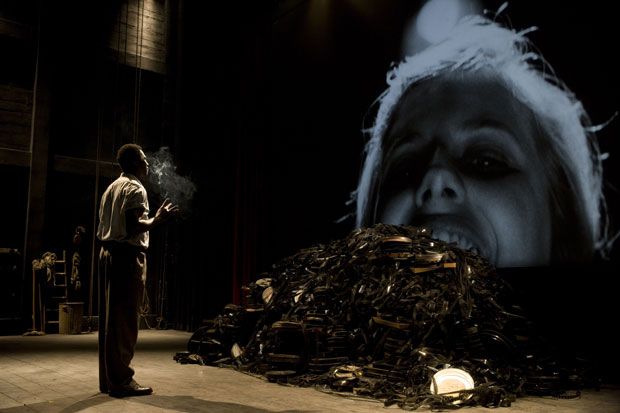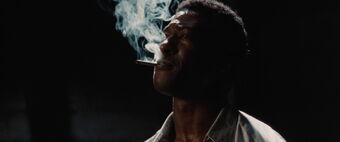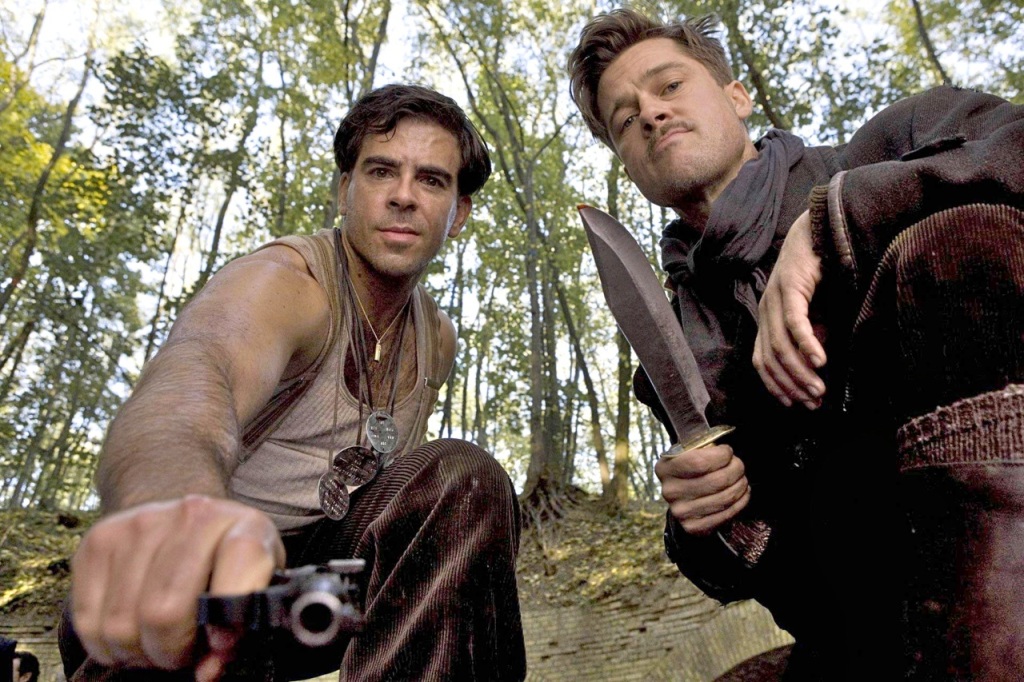
A band of Jewish American boys setting out to kill Adolf Hitler in the climax of WWII makes for a damn good story–especially when you’re Quentin Tarantino, a master weaver of revenge-lore.
When details of the Basterd’s script trickled to media masses, a mixed bag of reactions were met. Some doubted Tarantino’s ability to tackle a war film, let alone the war: WWII. The addition of scenes complete in foreign languages also made some critics cringe. Then, there was the tender subject of anti-semitism and the painful oppression of Jewish people at the hands of Adolf Hitler and his Nazis. Would there be enough sensitivity and respect in the ways there needed to be?
The answer came on August 21, 2009. I sat in the theater, seriously enthused, at midnight for what I hoped would be Tarantino’s best work yet. And for me, that’s exactly what it was.
When I saw Inglourious Basterds for the first time, I was moved. I remember thinking, “How blessed are we to see one of the greatest directors of our generation in his prime on opening night?” The entire experience was gift–a very rare one at that. Immediately, I went home and spoke about the film to pretty much anyone who would kindly listen.
Ten years later, I’m still up to the same trouble. Inglourious Basterds preserves like an expensive designer bag in my film collection. It never wears or tears, it goes with every mood, and its quality is unmatched.


From the jump, the opening scene gives you exactly what you need–never what you want. Because what you want would play it safe or crowd the pacing and voice. You need your heart to be broken and tested. And with Hans Landa (Christoph Waltz), the driver on this route through heck, we sit back in horror in witness of the atrocities our Jewish brothers and sisters endured. Chekov’s guns are loaded within. They’re so neat, yet personable. Anyone can pick them up. I’ve always found this to be one of Tarantino’s strong suits. He’s not a doctor, cop, scientist, lawyer, or an elitist attempting to appear smarter than he is. He’s just a guy who really likes movies, making the task of understanding his material effortless. Emotions hit harder this way. As Landa lays the bricks for a meandering yet methodical conversation we learn Perrier LaPadite is in fact hiding a Jewish family below his home. Fear sweeps into the viewer, and if you’re any bit of emotional like me, you too will have covered your mouth as Shoshanna does so that Landa “The Jew hunter” never finds her. A clock ticks in the background, a gauge for the high stakes. As Shoshanna flees from Landa’s crosshairs, it’s apparent our heroes don’t have much time to wait on fate to deal with this kind of evil.
Basterd’s introduction is as accomplished, clear, cunning and charismatic as its antagonist. With dialogue so natural and purposeful, it manages to be one of, if not the best opening sequence of modern film.
The time bomb is set, the Basterd’s vow to get 100 Nazi scalps each, and the film flows into Tarantino’s stylistic chapter format. This is a risky form–one that should only be done if the skill is there–and Tarantino has this skill. Each chapter is tightly wrapped in presentation with a bow and all. Chapter titles tease a bit of the story. As the following chapter comes, the story snowballs, the clock ticks louder and by the final act, Tarantino’s built a suspense that draws a collective applause from the audience.




Such things seem accomplished by the mastermind of the director, but as we all know, it takes a team to make a movie live. Sally Menke, Tarantino’s friend/editor is responsible for editing all of his first six films. She has an eye for frames and timing like I’ve never seen. As a writer, we tend to be a bit wordy, as it is so easy for us to wander into “Expositionland”, but with editors like Sally, those detours are canceled. Her eye is the reason pacing is steady as we like it, bumpy when we like it and devastating when we feel it. No lag. With Sally, the story was pushed to perfection, causing Tarantino to cut many scenes like Aldo’s discovery of the Killer Crows–a troop of black soldiers plotting their own revenge on the white officers who had done them wrong; the backstory of beloved character Donny “The Bear Jew” Donowitz, and the appearance of Madame Mimieux, the aunt who gifted Shoshanna her cinema. All would’ve been glorious–no pun intended– but they were not integral. Keeping them would’ve lost attention spans and turned the film into something else. But for 153 minutes we sit, feel and react without noticing the time, proving that magic is most certainly in the editing.



The team of Menke-Tarantino was always lightning in a bottle. He flourished alongside her, just as she flourished alongside him–they’d sweep award season with wins for Pulp Fiction, Reservoir Dogs, Kill Bill Vol. 1 and 2. However, Inglourius Basterds is where Sally’s skills shined brightest. This is the work of a woman at the peak of her career, the top of her game. Sadly, after her passing, her absence from Tarantino films can be felt. Those smart choices which assisted in sharpening the bite of Landa’s evil, bonding our allegiance with the Basterd’s and bringing us to cheer their gory victories are much more noticeable beside The Hateful Eight and Once Upon a Time in Hollywood. All of Tarantino’s films shine in their own right, no doubt, but Sally Menke brought their vibrancy to a blinding level.






Any Tarantino film boasts an exceptional cast. Whether they be “A-list” or actors Hollywood has chewed up and spit out, each Tarantino film roster is a band of motley crew misfits from the jump, and I’m not sure why that is. Perhaps it’s the doubt. No matter the hill of previous success, it seems Tarantino is always questioned as though he’s been a fluke. Or maybe it is the boldness and conviction behind his choices–because no one can do what they actually want, that’s unheard of (enter sarcasm). Whatever it is, it works. The A-list aren’t so A-list in a Tarantino film. Leo DiCaprio is Calvin Candy. Actually Calvin “slave owning” Candy. Brad Pitt is an anti-fascist country boy who haphazardly seems to survive everything, and I mean everything–check the scarred throat. Jamie Foxx is Django and the ‘D’ is silent, dammit. And Samuel L. Jackson is whatever motherfucker Tarantino wants him to be. However, there hasn’t been a more exciting breakout performance than that of Christoph Waltz as Colonel Hans Landa–who I feel to be one of the most well written villains of all times. Tarantino feared he was just that, a character meant for the pages , until he met Christoph. “The minute he enters a scene, he dominates it. All the things that he was supposed to be good at, he was that good at them. I found I had a really interesting situation with him that has been hard to have with any other character,” states Tarantino. Christoph read the lines like a sociopath and could naturally speak all languages the character does. This casting could not have been anymore destined. I can’t rave about him enough. It’s no wonder he won an Oscar for his performance. Tarantino also credits him with saving his movie–as he was close to shelving or releasing the project as a book. In short, there are no complaints among casting. Brad Pitt, Christoph Waltz, Diane Krueger, Eli Roth, Melanie Laurent, Til Schweiger, Michael Fassbender, Daniel Brühl, and a comically not so sneaky cameo from Mike Myers, Inglourious Basterd’s casting stands as perfection over ten years later. These actors shine because Tarantino is gifted in getting out of the way and allowing his characters to be immorally them; and also for the love of the craft and opportunity.

This film is a sick time, every time. New details surface upon every watch, and it further cements its status as my favorite Tarantino film, not only for its artistic approach, but its risk taking. I remember staring at the screen as revenge was served, and wondering what it’d be like to feel fuller than I did then. We’ve all wanted to see Hitler get his. What if the other oppressors did? Then in 2012, with Django Unchained, I got another gift.
Tarantino writes for the downtrodden underdog, and avenges their pain with a mere pen. No matter what retirement brings him, his mark on the world with works like Inglourious Basterds chant generational traumas away while firmly making it clear that “a Nazi ain’t got no humanity”, and has zero business breeding hate.
–Tia